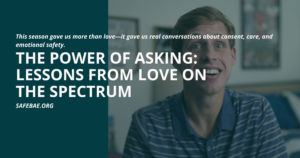The Power of Asking: Lessons from Love on the Spectrum
This season gave us more than love—it gave us real conversations about consent, care, and emotional safety.
Consent and Boundaries Were Front and Center on This Season of Love on the Spectrum
The newest season of Love on the Spectrum U.S. offered something genuinely powerful: honest, respectful, and emotionally grounded conversations about consent and boundaries.
Unlike most dating shows that speed through the “getting to know you” phase, this series lets us see something much more real—what it looks like to move at your own pace, to ask questions, to navigate emotional and physical intimacy with care, and to respect someone else’s limits.
Take Tanner and Callie, for example. Their connection grew slowly and intentionally, with both of them clearly checking in—not just about feelings, but about emotional comfort. Then there’s Connor and Georgie, whose relationship showed how checking in doesn’t have to be awkward or performative—it can just be part of how two people care for each other.
And in one of the most honest moments of the season, Dani and Adan chose to end their relationship after discovering they had different values around intimacy and marriage. Rather than forcing something that didn’t feel right for either of them, they honored those boundaries with mutual respect—and without shame.
These moments weren’t “teachable” in a forced way. They were just part of the natural flow of each relationship. And in that, Love on the Spectrum gave us something rare: a reminder that boundaries aren’t walls—they’re invitations to connect more meaningfully.
What Asking Looks Like—and Why It Matters
One of the most powerful things about this season of Love on the Spectrum was how clearly it showed us what enthusiastic, verbal consent actually looks like—without turning it into a lesson.
When Tanner asked Callie if he could kiss her, she smiled and said yes—but added that she’d prefer a kiss on the cheek. Later, as their relationship progressed, Tanner asked again—and this time, they shared a kiss on the lips. The same pattern unfolded with Connor and Georgie. On their earlier dates, Georgie gently redirected the moment to a kiss on the cheek, and on a later date, after more connection and comfort, she gave him the green light for more.
These moments were a real-time example of how consent isn’t a one-time box to check. It’s an ongoing dialogue. And asking again later, after more trust is built, doesn’t make it awkward. It makes it safer.
These moments are powerful for all viewers, but especially meaningful for neurodivergent people—who often aren’t represented in media conversations around dating, consent, or emotional intimacy. And beyond the screen, there’s a bigger issue that doesn’t get talked about enough: people on the autism spectrum, particularly women and girls, face an increased risk of sexual abuse.
According to a 2018 study published in Research in Autism Spectrum Disorders, approximately half of women and girls with autism experience sexual victimization in their lifetime—a rate significantly higher than for neurotypical peers.¹ Limited access to comprehensive sex education, combined with social communication differences and a lack of inclusive resources, often leaves neurodivergent youth more vulnerable.
That’s why it’s so important for shows like Love on the Spectrum to model these behaviors authentically—and why SafeBAE believes consent education should be inclusive, trauma-informed, and neurodivergent-affirming.
When we see people ask questions, name their needs, and set boundaries without shame, we’re reminded that everyone deserves the right to feel safe, respected, and in control of their body and experiences—no matter where they are in life or on the spectrum.
When Boundaries Don’t Align—And Respect Still Comes First
One of the most powerful moments of emotional maturity this season came from Dani and Adan. After a few dates and a budding connection, they sat down for a conversation about something that can be make-or-break in any relationship: expectations around intimacy.
Adan shared openly that he wanted to wait until marriage before becoming physically intimate. Dani, while clearly fond of Adan and respectful of his beliefs, expressed that she didn’t feel the same. And what happened next was rare—not just for reality TV, but for conversations about dating in general.
They talked about it. Genuinely. Calmly. Respectfully.
There was no pressure to compromise, no guilt-tripping, no shame. Just two people realizing that their values didn’t align—and making the mutual decision to part ways without resentment.
That’s what real boundary-setting looks like. Not just saying “no,” but listening, self-reflecting, and honoring someone else’s limits—even when it means walking away. For young people watching, it was a reminder that setting boundaries doesn’t mean you don’t care about someone. It means you care about yourself enough to advocate for what’s right for you—and respect the other person enough to let them do the same.
Why These Conversations Matter—And What We’re Doing About It
Watching Love on the Spectrum this season, one thing became clear: when people are given the space to express their boundaries, ask questions, and walk away with respect, it changes everything.
Whether it’s asking for a kiss, navigating differences in intimacy values, or simply learning how to check in with your partner—these are conversations all young people deserve to see and learn how to have. And at SafeBAE, we’re making sure they do.
Through our peer-led education, chapter programs, and faculty + parent trainings, we’re helping schools and communities build a culture where these conversations aren’t awkward or avoided—they’re expected, normalized, and empowering.
💛 Want to bring SafeBAE to your school? Host a speaker
🌱 Want to learn how to talk about boundaries and consent? Sign up for our Peer Educator Training
🎓 Want to go even deeper? Apply to our Summer Activist Institute
💸 Or support this work by donating today
This generation is ready for real prevention—and we’re here to make sure they have the tools to build it.


